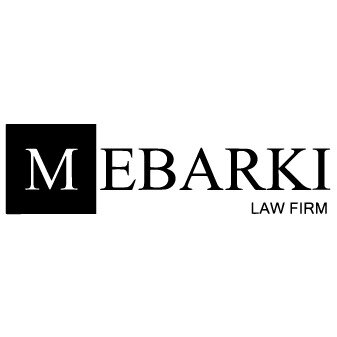Best Energy, Environment & ESG Lawyers in Algeria
Share your needs with us, get contacted by law firms.
Free. Takes 2 min.
Or refine your search by selecting a city:
List of the best lawyers in Algeria
About Energy, Environment & ESG Law in Algeria
Energy, Environment, and ESG (Environmental, Social, and Governance) law in Algeria covers the legal framework surrounding the extraction and production of energy resources, environmental protection, sustainable development, and the integration of ESG standards into business practices. Algeria is one of Africa’s largest energy producers, primarily focused on oil and natural gas. As environmental concerns and sustainability initiatives increase globally, Algeria has adopted laws and regulations to govern resource management, pollution control, and corporate responsibility. The legal landscape in this area is continually evolving to balance economic interests with environmental sustainability and social considerations.
Why You May Need a Lawyer
You may require a lawyer experienced in Energy, Environment, and ESG law in Algeria for various reasons. Common situations include:
- Securing permits and licenses for energy projects, including oil, gas, and renewables
- Complying with environmental regulations and addressing claims of environmental damage or pollution
- Negotiating energy contracts and joint venture agreements
- Handling disputes or litigation involving government entities or private partners
- Understanding and implementing ESG requirements for investors, shareholders, or regulators
- Seeking guidance on land use, natural resource access, and related tax implications
- Responding to new laws or regulatory changes affecting ongoing operations
- Navigating complex reporting and disclosure requirements for environmental and social impacts
Local Laws Overview
Algeria’s Energy, Environment, and ESG legal framework is built upon several key statutes and regulations:
- Energy Laws: The main laws governing oil and gas are the Hydrocarbons Law (Law No. 19-13 of 2019) and various implementing decrees. These regulate exploration, production, and export, including provisions for state participation through Sonatrach, the national oil company.
- Environmental Protection: Law No. 03-10 (2003) is a cornerstone for environmental protection, setting out principles for pollution prevention, environmental impact assessments, and penalties for non-compliance. Sector-specific regulations cover water, air, and waste management.
- Renewable Energy and Efficiency: Policies encourage investment in solar and wind energy, supported through national energy strategies and the Renewable Energy and Energy Efficiency Development Program.
- ESG and Corporate Responsibility: While ESG-specific regulations are emerging, environmental and labor laws contain requirements for social and governance standards. Businesses with foreign investment often follow international ESG frameworks in addition to local rules.
- International Agreements: Algeria is a party to global treaties such as the Paris Agreement, influencing domestic policy and environmental standards.
Frequently Asked Questions
What types of environmental permits are required for energy projects in Algeria?
Most energy projects must undergo an environmental impact assessment and receive specific permits from the Ministry of Environment before beginning operations. Additional permits may be needed for water use, waste management, and emissions control.
Who regulates the oil and gas sector in Algeria?
The Ministry of Energy and Mines is the primary regulator, working closely with agencies such as Alnaft for upstream activities and Sonatrach as the national oil company.
What penalties exist for environmental non-compliance?
Penalties include fines, suspension of activities, or even shutdown of operations for severe or repeated violations. Criminal charges can be brought for egregious violations endangering public health or the environment.
Is renewable energy investment encouraged in Algeria?
Yes, Algeria offers incentives for solar, wind, and other renewable energy projects, and the government has established national targets for increasing renewable capacity.
Are ESG disclosures mandatory in Algeria?
Mandatory ESG disclosures are not yet comprehensive, but environmental reporting is required for certain sectors. Many multinational businesses align with global ESG standards on a voluntary basis.
Does foreign investment in energy require special approvals?
Yes, foreign investors must comply with local content requirements and often partner with Sonatrach or other state entities. Government approvals are required for entering the hydrocarbons sector.
How can communities impacted by energy projects seek remedies?
Affected communities can file complaints with local authorities or initiate legal proceedings for environmental damage or insufficient compensation as provided by law.
What laws govern waste management in Algeria?
Waste management is governed by the Environmental Law and sectoral regulations. Companies must follow rules for the collection, treatment, and disposal of hazardous and industrial waste.
Can energy project disputes be resolved through arbitration?
Yes, arbitration clauses are common in energy contracts, and Algeria recognizes both domestic and international arbitration proceedings.
What steps are involved in complying with environmental laws?
Key steps include conducting impact assessments, obtaining necessary permits, monitoring ongoing compliance, reporting regularly to regulators, and addressing any violations promptly.
Additional Resources
Individuals seeking further information can consult the following:
- Ministry of Energy and Mines - responsible for policy and regulation of the energy sector
- Ministry of Environment and Renewable Energy - overseeing environmental standards and permitting
- Alnaft (National Agency for the Valorisation of Hydrocarbon Resources) - manages upstream hydrocarbons
- Sonatrach - national oil and gas company, partner to many energy projects
- National Agency for Waste (AND) - provides guidance on waste management and recycling
- Local law firms specializing in energy and environmental law
- Algeria’s Chamber of Commerce and Industry - offers information on investment requirements and regulations
Next Steps
If you need legal assistance in the field of Energy, Environment, or ESG in Algeria, consider the following steps:
- Identify your specific legal needs, such as permitting, compliance, contract negotiation, or dispute resolution
- Gather all relevant documents and information about your project or concern
- Reach out to a specialized lawyer or law firm with experience in Algerian energy and environmental law
- Prepare a list of questions and your objectives for your legal consultation
- Consider ongoing legal support for compliance monitoring and regulatory updates
- Keep abreast of changes in local and international laws that may affect your situation
Taking the right legal steps early can ensure regulatory compliance, protect your investments, and support sustainable development objectives in Algeria’s energy sector.
Lawzana helps you find the best lawyers and law firms in Algeria through a curated and pre-screened list of qualified legal professionals. Our platform offers rankings and detailed profiles of attorneys and law firms, allowing you to compare based on practice areas, including Energy, Environment & ESG, experience, and client feedback.
Each profile includes a description of the firm's areas of practice, client reviews, team members and partners, year of establishment, spoken languages, office locations, contact information, social media presence, and any published articles or resources. Most firms on our platform speak English and are experienced in both local and international legal matters.
Get a quote from top-rated law firms in Algeria — quickly, securely, and without unnecessary hassle.
Disclaimer:
The information provided on this page is for general informational purposes only and does not constitute legal advice. While we strive to ensure the accuracy and relevance of the content, legal information may change over time, and interpretations of the law can vary. You should always consult with a qualified legal professional for advice specific to your situation.
We disclaim all liability for actions taken or not taken based on the content of this page. If you believe any information is incorrect or outdated, please contact us, and we will review and update it where appropriate.
Browse energy, environment & esg law firms by service in Algeria
Algeria Attorneys in related practice areas.
Browse energy, environment & esg law firms by city in Algeria
Refine your search by selecting a city.












